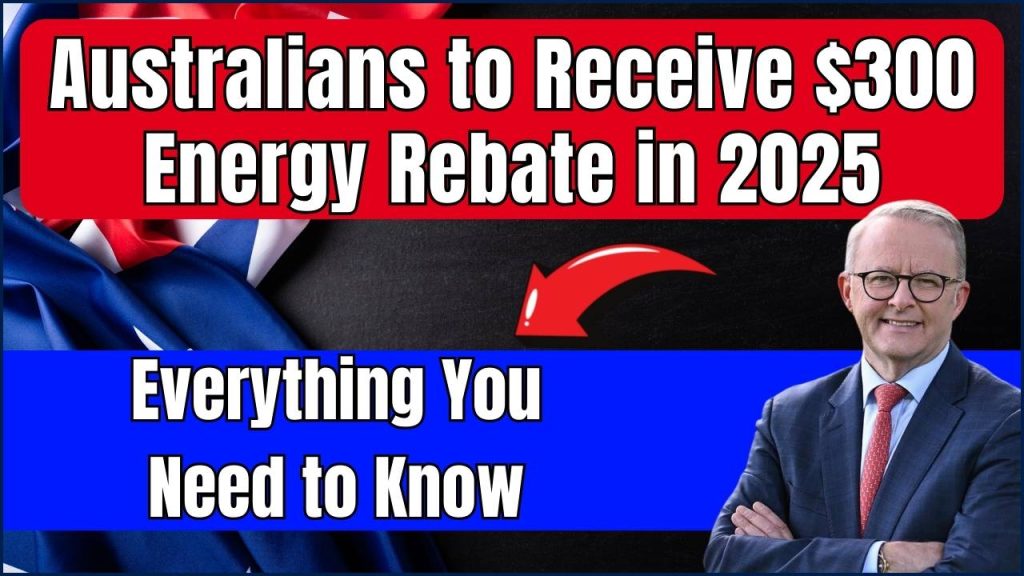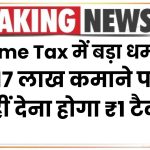$300 Energy Rebate in 2025: Australians across the nation are set to receive a $300 energy rebate in 2025, aimed at alleviating the burden of rising electricity costs. This government initiative will directly benefit households and small businesses, ensuring essential energy remains affordable for everyone. By providing direct credits to electricity bills, this program highlights the government’s commitment to addressing cost-of-living pressures while supporting a more sustainable energy future.

Let’s dive into the details of how this rebate works, who is eligible, and what steps you need to take (if any) to benefit from it. We’ll also explore energy-saving tips to help you maximize your financial relief.
$300 Energy Rebate in 2025
| Aspect | Details |
|---|---|
| Rebate Amount | Up to $300 for households; Up to $325 for small businesses |
| Eligibility | Active electricity accounts for households and small businesses |
| Distribution | Quarterly installments: $75 per quarter for households; Special schedules apply for WA and Victoria |
| Action Required? | None for most; embedded network users may need to apply via local authorities |
| Official Resource | Supporting Australians |
The $300 energy rebate is a welcome initiative for Australians, easing the financial burden of rising electricity costs. With automatic distribution for most and clear guidance for those in special circumstances, this program demonstrates the government’s commitment to supporting households and small businesses. Moreover, by adopting energy-saving practices, Australians can amplify the benefits of this rebate while contributing to a more sustainable energy future.
Take advantage of this relief, stay informed, and make practical changes to ensure long-term savings on your energy bills.
What Is the $300 Energy Rebate?
The $300 energy rebate is part of a broader government strategy to reduce the cost of living and address increasing energy expenses. Over 10 million households and 1 million small businesses are set to benefit during the 2024-2025 financial year. The rebate will be credited directly to electricity accounts, providing immediate relief to those struggling with high energy costs.
A Closer Look at Eligibility
- Households: This includes residential customers with active electricity accounts, ensuring that families can manage their energy expenses more effectively.
- Small Businesses: Eligible businesses must operate from non-residential premises and have commercial electricity tariffs, meeting state-specific energy usage thresholds. This category covers a diverse range of businesses, from retail shops to small manufacturing units.
Why This Rebate Matters
Electricity costs have risen significantly in recent years, placing financial strain on families and businesses. Factors such as increased demand, supply chain disruptions, and global energy market volatility have contributed to these rising costs. The government’s intervention through this rebate program ensures equitable support, helping Australians manage their energy bills.
This initiative is not only a financial lifeline but also an opportunity to raise awareness about energy efficiency. By taking advantage of this rebate and implementing energy-saving measures, Australians can achieve long-term cost reductions and contribute to a more sustainable energy future.
How Will the Rebate Be Distributed?
For Households
Households will receive up to $300 in four quarterly installments of $75 each. This distribution ensures consistent support throughout the year, helping families budget for their energy expenses.
- Example: If you are based in New South Wales, you’ll notice the credit applied to your electricity bills in July 2024, October 2024, January 2025, and April 2025.
- Western Australia Exception: Residents will receive two installments of $150 each in July and December 2024, reflecting regional variations in energy policy.
For Small Businesses
Small businesses will benefit from up to $325, also distributed in quarterly installments:
- $81.25 per quarter in most states, ensuring ongoing relief for operational costs.
- Special Case for Victoria: Businesses in Victoria will receive a lump sum installment of $325, simplifying the process for local enterprises.
Steps to Access the Rebate
The good news is, no action is required for most Australians! Your electricity retailer will automatically apply the credit to your bill. However, some customers may need to take additional steps to claim their rebate.
Embedded Network Customers
If you live in an apartment block, caravan park, or retirement village, or if your small business operates within a shopping center, your electricity is likely managed through an embedded network. In this case, you’ll need to:
- Contact your state or territory energy authority.
- Submit an application for the rebate.
- Provide necessary documentation, such as proof of residence and electricity usage.
Frequently Asked Questions (FAQs) About $300 Energy Rebate
1. What if I change electricity providers during the year?
If you change providers, your eligibility for future installments will depend on your account’s status during specific census dates, such as:
- July 31, 2024
- October 1, 2024
- January 1, 2025
- April 1, 2025
Ensure your account remains active during these dates to receive the corresponding credit.
2. Are renters eligible for the rebate?
Yes, renters qualify as long as they have an active electricity account in their name. This ensures that tenants benefit directly from the government’s support.
3. Can I opt-out of the rebate?
The rebate is automatically applied. If you wish to opt-out for any reason, you’ll need to contact your electricity provider directly. However, opting out is uncommon, given the financial benefits.
4. What about solar-powered homes?
Households with solar panels are still eligible for the rebate as long as they maintain an active connection to the grid. This ensures that all participants in the energy system receive support, regardless of their renewable energy use.
$255 Centrelink Cost of Living Boost: January 2025 Payment Details and Eligibility
Centrelink Payments to Rise in 2025: Full Details of Indexation Increase
Practical Tips for Managing Energy Bills
While the rebate provides financial relief, adopting energy-efficient practices can further reduce your costs. Here are some actionable tips:
- Use Energy-Efficient Appliances: Look for appliances with high energy star ratings. For instance, switching to an energy-efficient refrigerator can save hundreds of dollars annually.
- Switch to LED Lighting: LED lights use significantly less energy and last longer. Replacing all bulbs in a household can lead to substantial savings.
- Monitor Energy Usage: Use smart meters or apps to track your daily consumption. Understanding your energy habits can help you make informed decisions.
- Seal Gaps and Insulate: Prevent heat loss or gain by sealing windows and doors. Proper insulation can reduce heating and cooling costs by up to 30%.
- Negotiate with Providers: Shop around for the best energy deals. Many providers offer incentives for switching, so don’t hesitate to compare rates.
- Time Your Usage: Use energy-intensive appliances during off-peak hours to benefit from lower rates.
By combining these practices with the rebate, you can significantly reduce your energy expenses and increase your savings.












4 thoughts on “Australians to Receive $300 Energy Rebate in 2025: Everything You Need to Know”